Contents
You have probably heard of Kubernetes but are not sure if you need to spend money on it and implement it in your start-up. I can understand that. In terms of managing resources, wasting money in the early days can kill a small start-up, creating setbacks and opportunities for your competitors to kick you out of the market.
On the other hand, if Kubernetes implementation can help your business and save money it is worth considering. So, if you have doubts, you need to understand what Kubernetes is so you can decide what to do.
Ready to go? Let’s start from the very beginning.
What is Kubernetes?
Not many people understand and can clearly explain what Kubernetes does in simple terms. Technical jargon can be confusing and difficult to understand, so I will keep it simple. Kubernetes is software that helps you quickly and easily make changes in every application you create and detect mistakes automatically. In short, it is all about automation.
Imagine you are the captain of a big ship with many crew members who have many different skills. If your boat hits an iceberg and begins sinking, you must quickly find the right crew members with the right skills to help you and save the ship. You do not have time to think! That is exactly what Kubernetes does for you: it helps you find the solution to your problem quickly.
Another good example – imagining yourself in a theatre listening to a concert. Look at the music director – he waves his wand and the whole orchestra plays in unison, creating wonderful music. But let’s imagine the music director became ill and was replaced by another person who doesn’t know the music the orchestra has prepared. What would happen? A horrible noise: no one knows when to play or what to do because they are not being led by the right person. Kubernetes is your music director – it organizes all the processes (musicians) so that your app works well and makes your clients happy.
Kubernetes is an open-source software, which means everyone can contribute to it – a cool and modern approach with great results. I have noticed that open-source projects are much more successful than private enterprises (Linux, GitHub) because they are created for the community and by the community.
How Kubernetes changed the world
You may say: that all sounds cool, but what exactly is Kubernetes consulting is used for, and do I really need it in my start-up? I could probably simply live without it and save lots of money.
But remember: in the early days of applications development and testing, it was necessary (and costly) to rent lots of servers. People invented virtual machines to help with this problem. These machines ran an operating system in an app window on your desktop which behaved like a full, separate computer. But this system also had a big disadvantage: your capabilities were limited by the disk space of your hardware (CPU power, RAM).
Kubernetes in numbers (infographic)
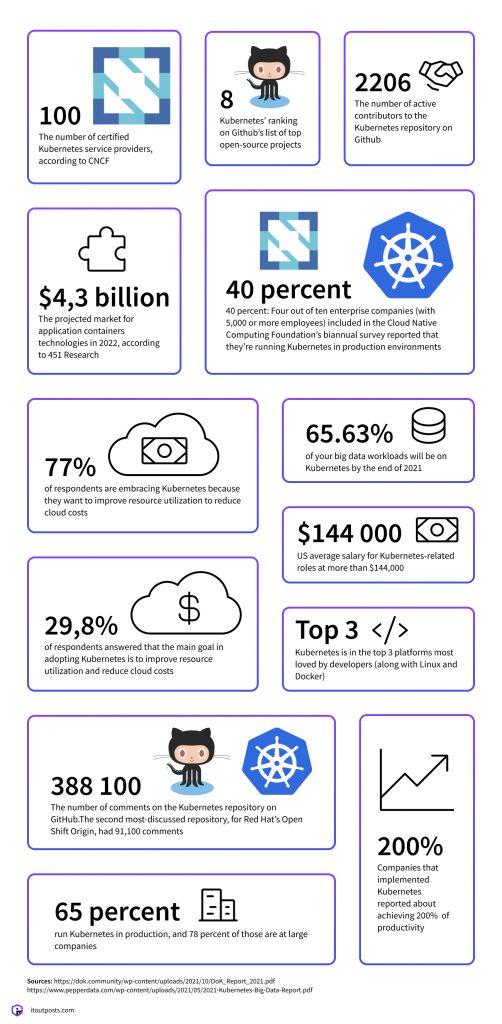
Then containers appeared, a cheap and simple solution that did not require powerful computers or a lot of memory. Containers were born under Linux and allow users to isolate one process from another.
Close your eyes and imagine thousands of suitcases full of clothes. All these suitcases are placed in the luggage compartment. You want to take out a green silk tie for your business lunch, but all the suitcases are similar, and you must open each one. This is where Kubernetes comes in. Kubernetes allows you to find that suitcase with the green tie quickly.
Like a luggage compartment, one application has lots of these containers. And to change even one color in your application, you need to change the code manually. That may be fine to do once or twice. But not on daily basis, especially if your application has millions of downloads. This is when Kubernetes comes into the game – it manages all those containers without any hassle.
Read also: Kubernetes engines
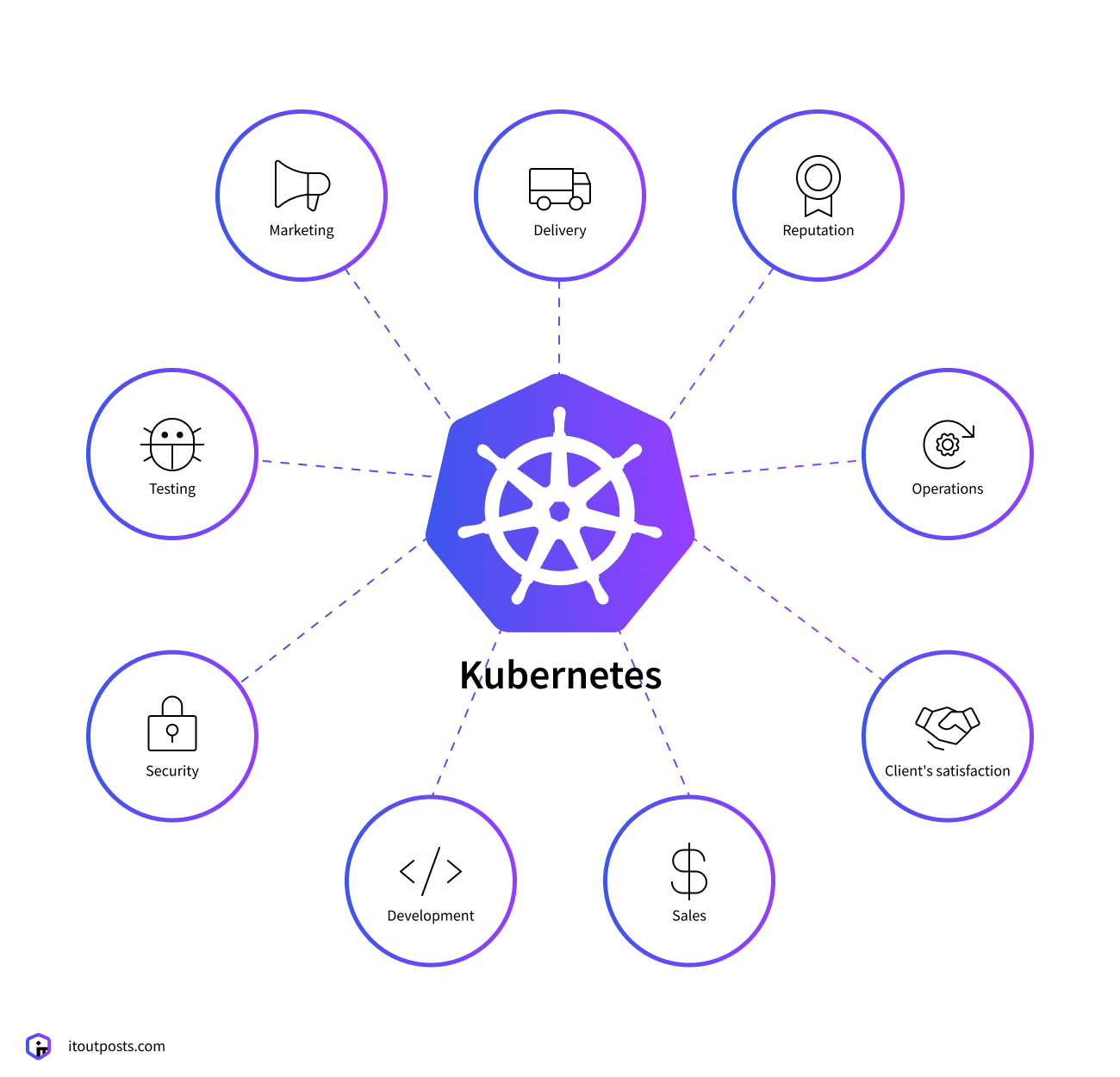
The problem with popularity
Popularity comes with unfortunate side effects! It is not enough to create a wonderful application and rejoice that you have millions of downloads. What if your app strains under all the attention, and then you cannot satisfy angry customers? If you’re not careful, very soon you will receive tons of negative reviews about how buggy your application is, the long wait time for new features to be released, and complaints about the app crashing all the time…
If the app isn’t working, your customers have no reason to stay, and will simply leave if things don’t improve. In short, if your customers are not happy, you lose your business. This can be overwhelming, and depressing. In those circumstances, what should you do? All you need are DevOps to run Kubernetes for you to continuously support and update your application.
Read also: Kubernetes Architecture
Which companies use Kubernetes?
Currently, over 2,770 tech companies use Kubernetes to support their business. Among them are such big names as Google, Udemy, The New York Times, Shopify, Alibaba, Intuit, and Asana.
Big names companies which use Kubernetes in their business
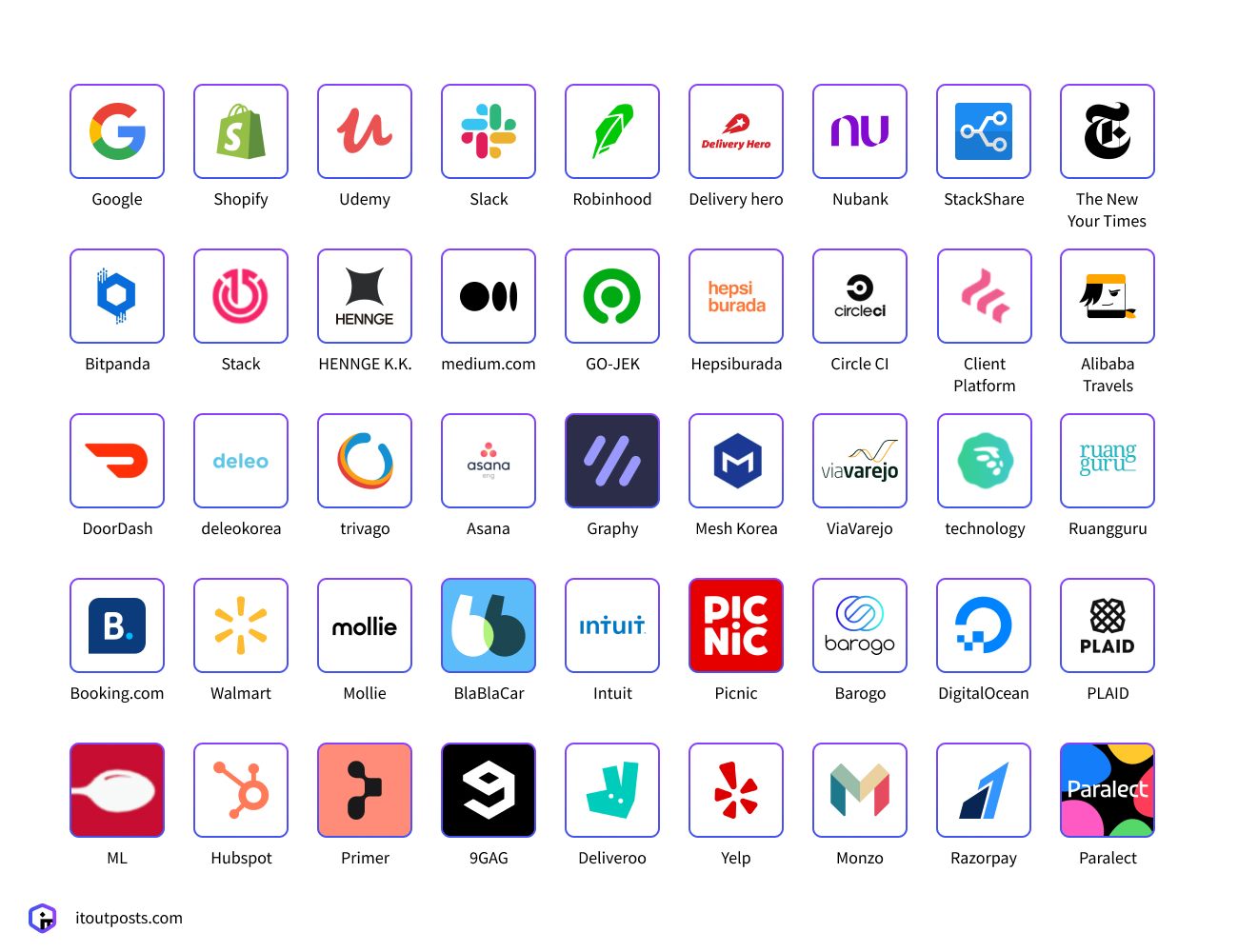
“If your application is complicated, use Kubernetes to make it simple. If your application is simple, don’t complicate it with Kubernetes.”
When should you use Kubernetes in your start-up?
If your application was built as a microservice
Microservices architecture is a software development technique that creates your application as a collection of thousands of containers. On one hand, it is much faster to build and does not require technical knowledge. But on the other hand, when you have millions of containers it is hard to manage all of them manually.
If your product suffers from slow development
If you feel that your product has a slow development time, you can run Kubernetes for your application to find and fix the problems quickly instead of hiring a team of developers.
If you have frequent server overload
if your application is loading slowly, users will not wait. They simply will go to your competitor. On sale days like Black Friday, that can be a huge loss. Kubernetes helps you to optimize resources so that your clients always enjoy a fast response from your application.
If you wish to cut your costs
Instead of renting servers, you can run Kubernetes. The containers that Kubernetes will pack your application into are very lightweight. Running them does not require much memory or storage.
This infographic will help you to understand if you really need Kubernetes for your application.
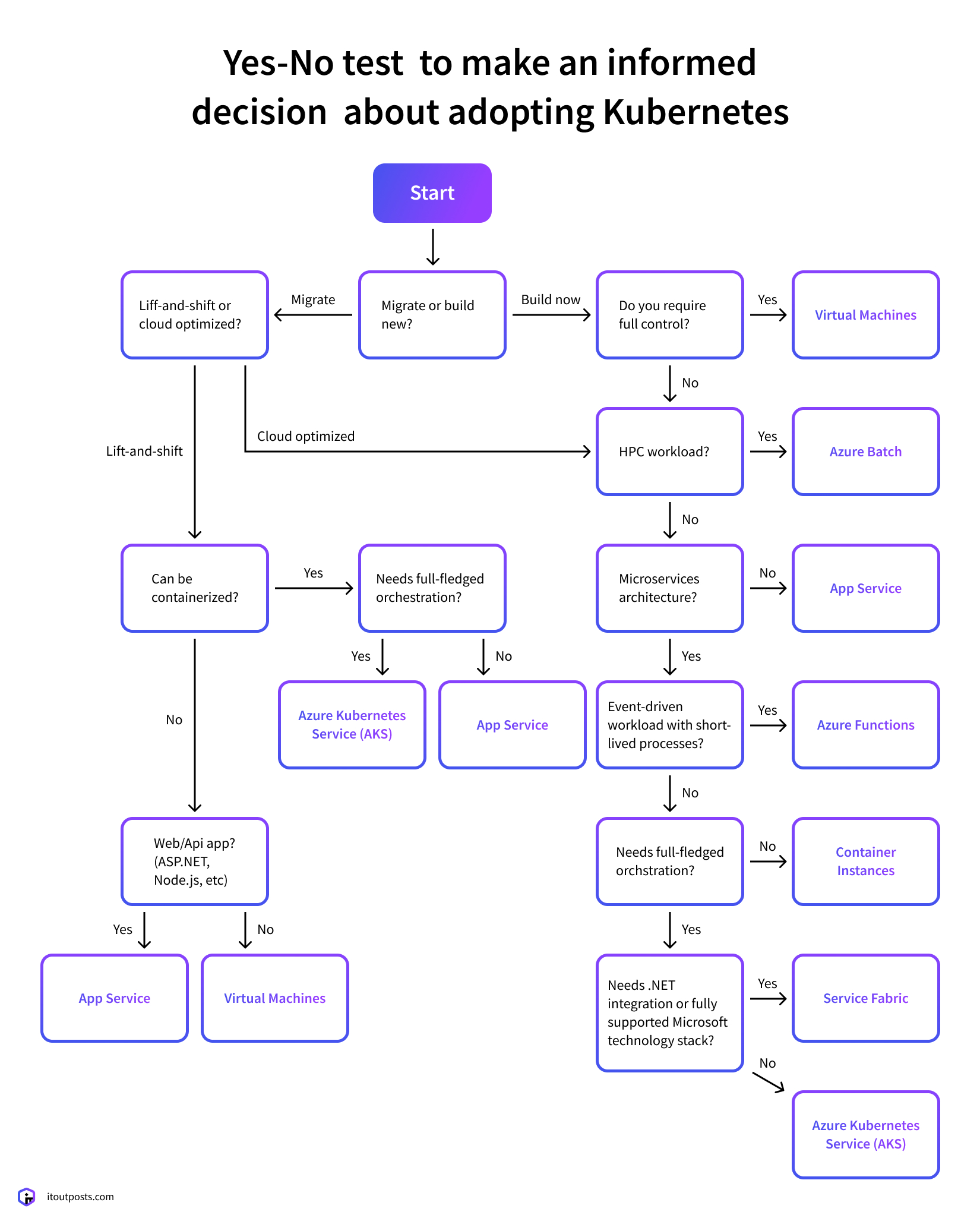
If you want to scale your application quickly
Do you have a cool start-up and want to scale it quickly? Kubernetes will smooth over all the potential growing pains. You will avoid angry complaints from customers because bugs will be fixed quickly. Kubernetes will optimize your resources and will not allow your application to crash or to be down.If you want to run your application on different cloud platforms
It does not matter which cloud platform (Azure, AWS, GSP) you have. Kubernetes can run all of them smoothly. This flexibility makes you independent, gives you freedom of choice, and allows you to easily change infrastructure whenever you want.When shouldn’t you use Kubernetes in your start-up?
If you have a simple, monolithic application
If your application is simple, lightweight, and created on monolithic architecture, using Kubernetes will be a waste of money. This is because all components are linked to each other, and it is easier to change manually than to run Kubernetes.If you’re a small start-up and do not want to scale
Kubernetes is a great option for rapidly growing start-ups. But if your start-up is only in the seed stage, it may be too costly a solution.If you do not have time to learn
Before implementing Kubernetes, you must teach your developer team how it works. It may take anywhere from a few weeks to a few months to learn the software. If you cannot dedicate the time and resources to do this properly, it probably is not the right option for you. You may be interested also in: Docker to Kubernetes migration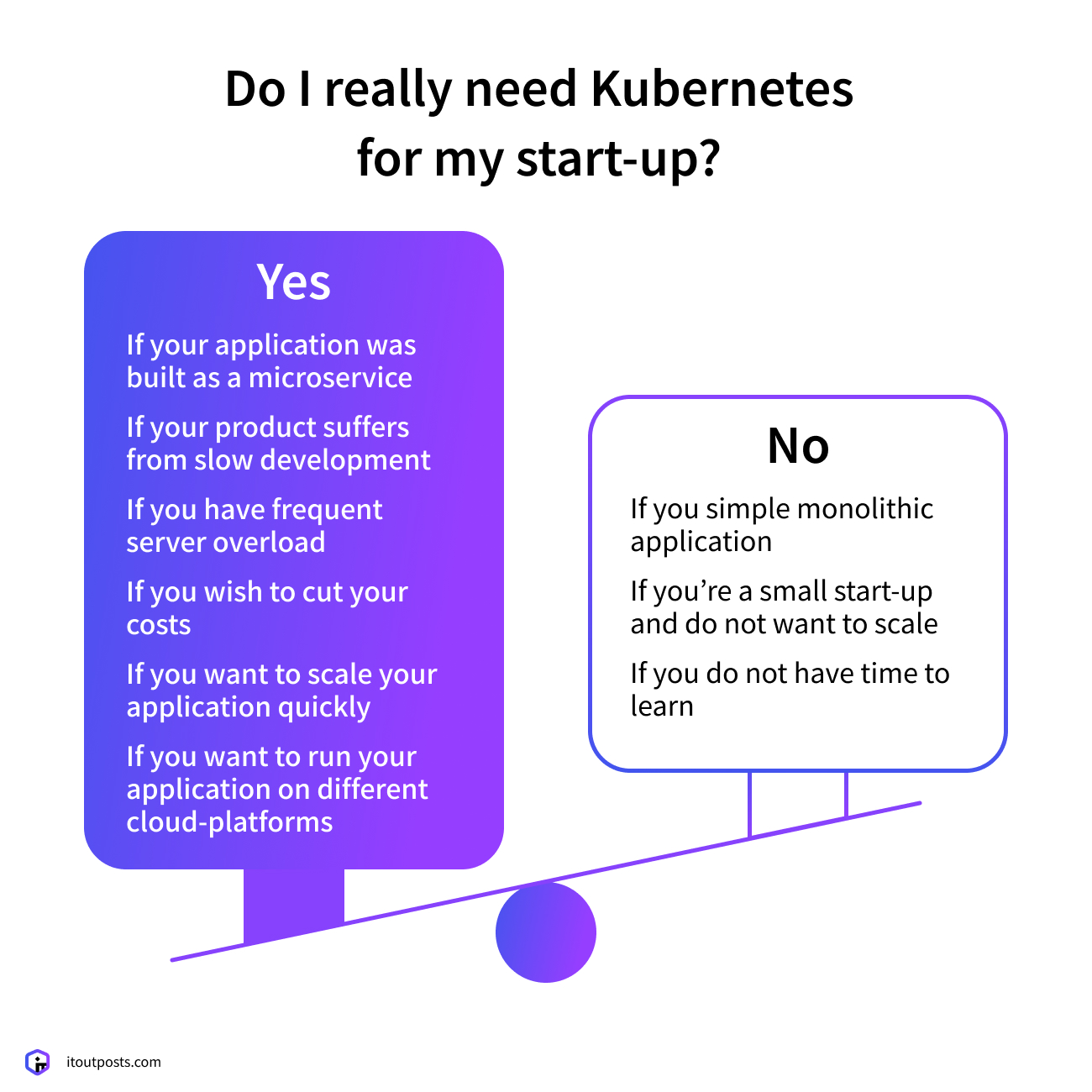
I am interested, how do I get started?
Kubernetes is an exciting tool that allows you to simplify the process of running and updating applications. It will decrease your infrastructure costs if you want to scale and spread your business. Do you believe Kubernetes can help your business? If so, then what you are waiting for? Fill the form below and our team will recommend the best solution to you absolutely for free. Talk with our team directly, describe your project requirements, and ask for suggestions. We will provide ready solutions based on our previous experience.FAQ
Why should I use Kubernetes for my start-up?
Because it is an open-source, independent solution that has lots of contributors all around the world.
Is Kubernetes secure?
There is no such thing as absolute security. But if many big-name companies use Kubernetes in their business, it means that it is quite efficient.
What can Kubernetes do for my start-up?
It will help you to scale your project and save money for your business.

I am an IT professional with over 10 years of experience. My career trajectory is closely tied to strategic business development, sales expansion, and the structuring of marketing strategies.
Throughout my journey, I have successfully executed and applied numerous strategic approaches that have driven business growth and fortified competitive positions. An integral part of my experience lies in effective business process management, which, in turn, facilitated the adept coordination of cross-functional teams and the attainment of remarkable outcomes.
I take pride in my contributions to the IT sector’s advancement and look forward to exchanging experiences and ideas with professionals who share my passion for innovation and success.